PGDip Mental Health Nursing 2020-2021: RPL Assessment Article Review
VerifiedAdded on 2022/09/15
|7
|1599
|17
Report
AI Summary
This report presents a critical analysis of the article "Critical analysis of a population mental health strategy: Effects on stigma for people with intellectual and developmental disabilities." The paper examines the methodologies used in mental health care, focusing on stigma issues among individuals with intellectual and developmental disabilities and mental challenges. The analysis highlights the strengths of the article, such as the incorporation of evidence-based anti-stigma interventions and the authors' detailed qualitative and quantitative data. The report also identifies weaknesses, including ethical considerations and potential contradictions. The conclusion emphasizes the need for the implementation of evidence-based practices to address stigma in mental health care, advocating for the integration of research findings with professional codes of conduct and nursing models to improve the quality of care and knowledge of future nurses. References include key articles related to the study's findings.
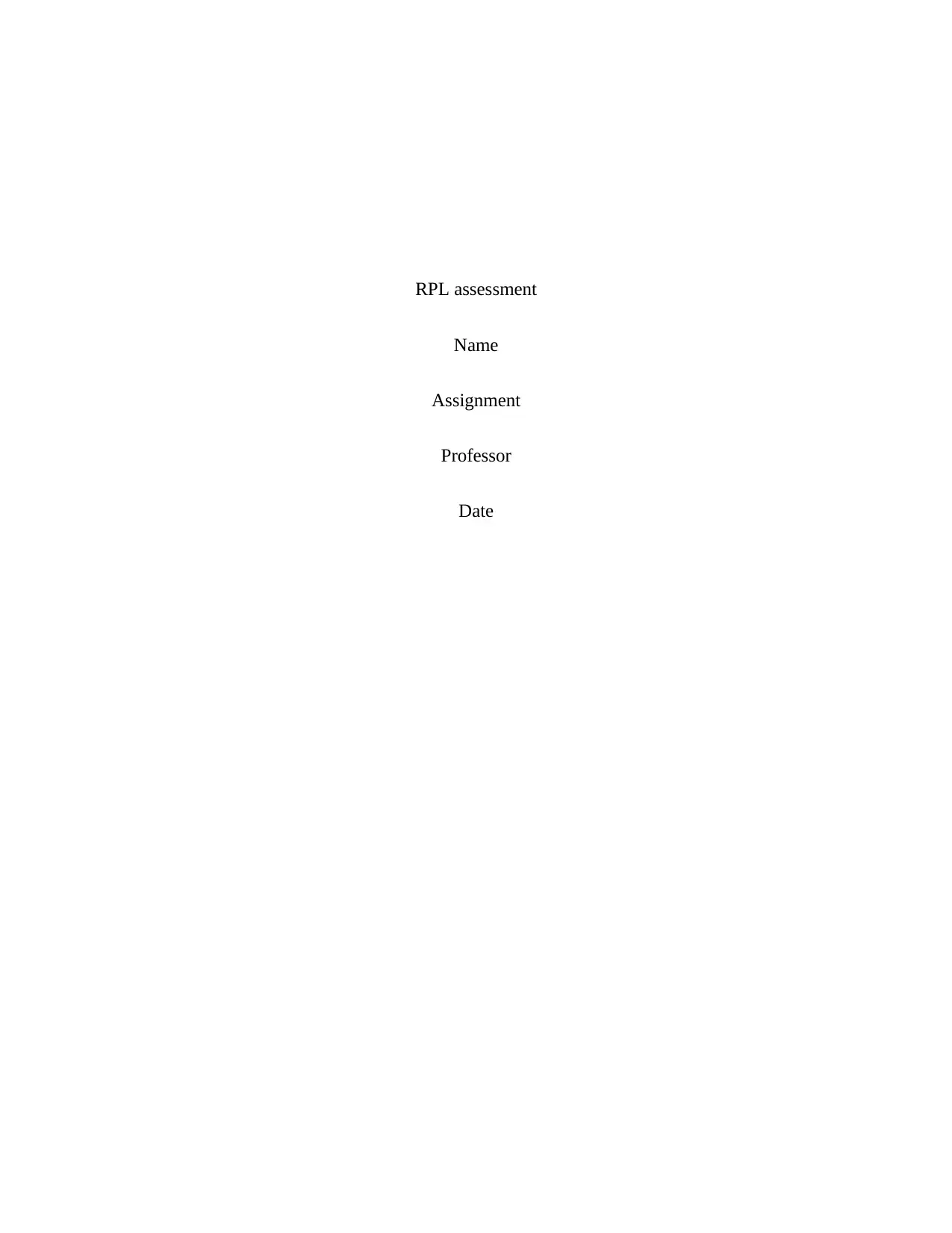
RPL assessment
Name
Assignment
Professor
Date
Name
Assignment
Professor
Date
Paraphrase This Document
Need a fresh take? Get an instant paraphrase of this document with our AI Paraphraser
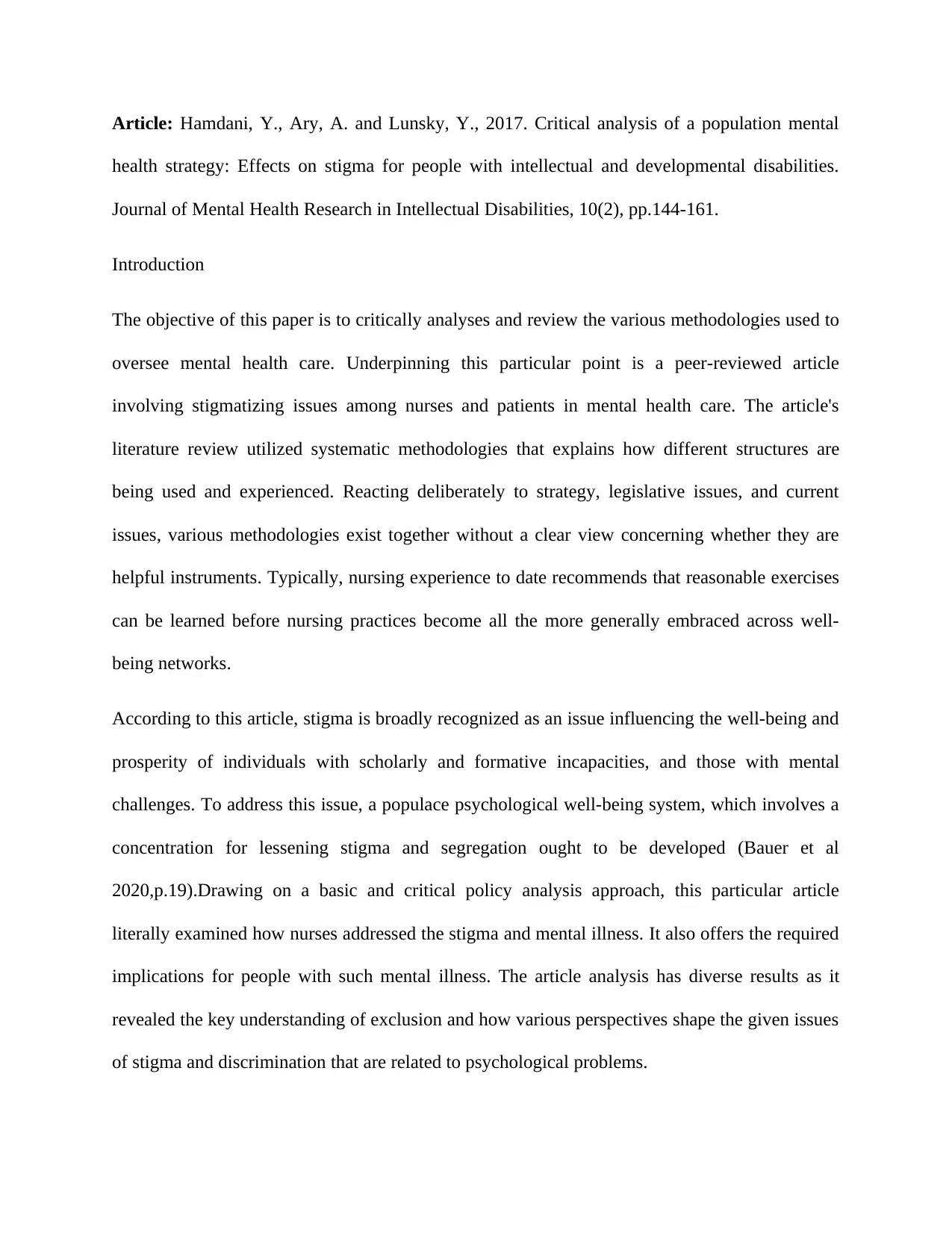
Article: Hamdani, Y., Ary, A. and Lunsky, Y., 2017. Critical analysis of a population mental
health strategy: Effects on stigma for people with intellectual and developmental disabilities.
Journal of Mental Health Research in Intellectual Disabilities, 10(2), pp.144-161.
Introduction
The objective of this paper is to critically analyses and review the various methodologies used to
oversee mental health care. Underpinning this particular point is a peer-reviewed article
involving stigmatizing issues among nurses and patients in mental health care. The article's
literature review utilized systematic methodologies that explains how different structures are
being used and experienced. Reacting deliberately to strategy, legislative issues, and current
issues, various methodologies exist together without a clear view concerning whether they are
helpful instruments. Typically, nursing experience to date recommends that reasonable exercises
can be learned before nursing practices become all the more generally embraced across well-
being networks.
According to this article, stigma is broadly recognized as an issue influencing the well-being and
prosperity of individuals with scholarly and formative incapacities, and those with mental
challenges. To address this issue, a populace psychological well-being system, which involves a
concentration for lessening stigma and segregation ought to be developed (Bauer et al
2020,p.19).Drawing on a basic and critical policy analysis approach, this particular article
literally examined how nurses addressed the stigma and mental illness. It also offers the required
implications for people with such mental illness. The article analysis has diverse results as it
revealed the key understanding of exclusion and how various perspectives shape the given issues
of stigma and discrimination that are related to psychological problems.
health strategy: Effects on stigma for people with intellectual and developmental disabilities.
Journal of Mental Health Research in Intellectual Disabilities, 10(2), pp.144-161.
Introduction
The objective of this paper is to critically analyses and review the various methodologies used to
oversee mental health care. Underpinning this particular point is a peer-reviewed article
involving stigmatizing issues among nurses and patients in mental health care. The article's
literature review utilized systematic methodologies that explains how different structures are
being used and experienced. Reacting deliberately to strategy, legislative issues, and current
issues, various methodologies exist together without a clear view concerning whether they are
helpful instruments. Typically, nursing experience to date recommends that reasonable exercises
can be learned before nursing practices become all the more generally embraced across well-
being networks.
According to this article, stigma is broadly recognized as an issue influencing the well-being and
prosperity of individuals with scholarly and formative incapacities, and those with mental
challenges. To address this issue, a populace psychological well-being system, which involves a
concentration for lessening stigma and segregation ought to be developed (Bauer et al
2020,p.19).Drawing on a basic and critical policy analysis approach, this particular article
literally examined how nurses addressed the stigma and mental illness. It also offers the required
implications for people with such mental illness. The article analysis has diverse results as it
revealed the key understanding of exclusion and how various perspectives shape the given issues
of stigma and discrimination that are related to psychological problems.
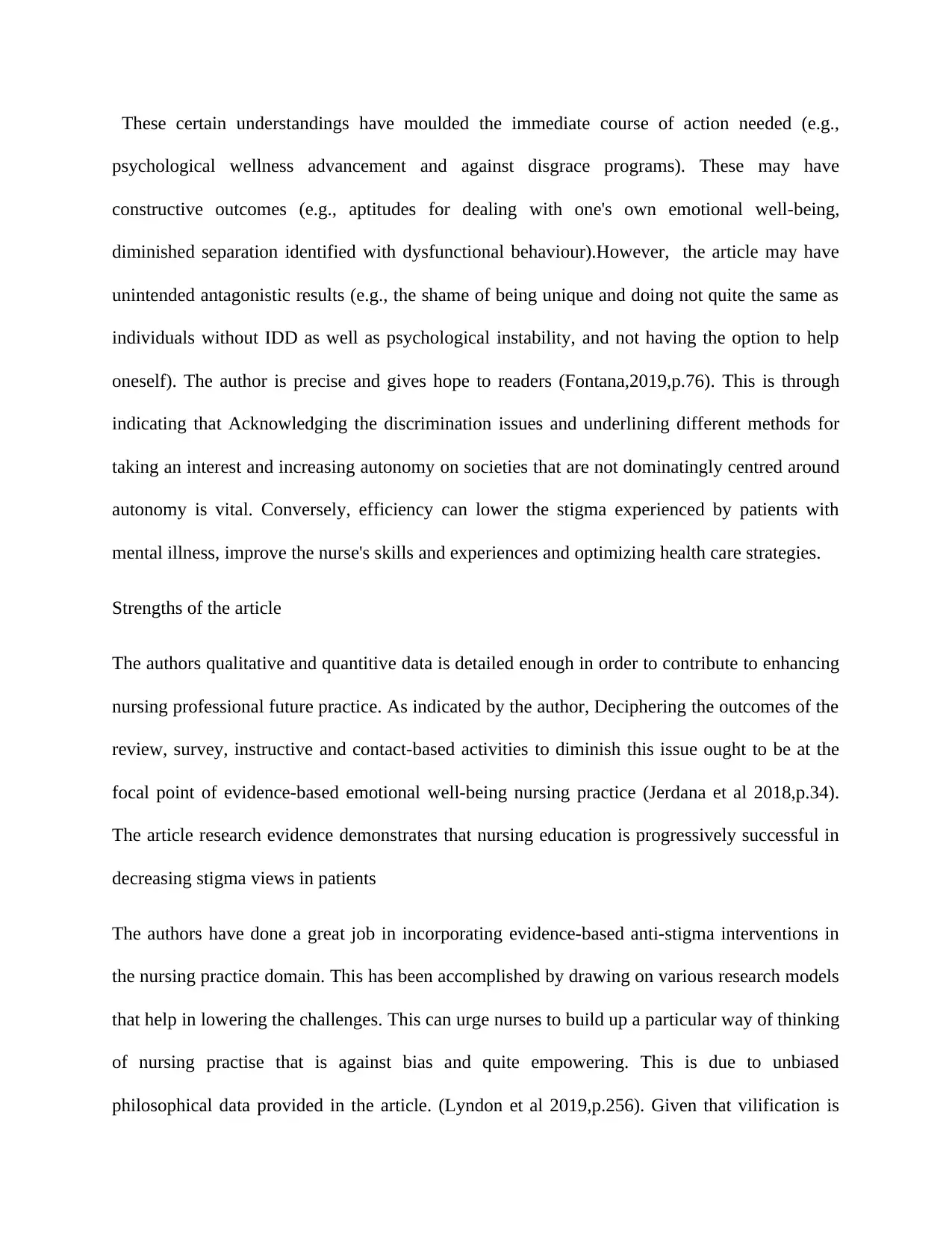
These certain understandings have moulded the immediate course of action needed (e.g.,
psychological wellness advancement and against disgrace programs). These may have
constructive outcomes (e.g., aptitudes for dealing with one's own emotional well-being,
diminished separation identified with dysfunctional behaviour).However, the article may have
unintended antagonistic results (e.g., the shame of being unique and doing not quite the same as
individuals without IDD as well as psychological instability, and not having the option to help
oneself). The author is precise and gives hope to readers (Fontana,2019,p.76). This is through
indicating that Acknowledging the discrimination issues and underlining different methods for
taking an interest and increasing autonomy on societies that are not dominatingly centred around
autonomy is vital. Conversely, efficiency can lower the stigma experienced by patients with
mental illness, improve the nurse's skills and experiences and optimizing health care strategies.
Strengths of the article
The authors qualitative and quantitive data is detailed enough in order to contribute to enhancing
nursing professional future practice. As indicated by the author, Deciphering the outcomes of the
review, survey, instructive and contact-based activities to diminish this issue ought to be at the
focal point of evidence-based emotional well-being nursing practice (Jerdana et al 2018,p.34).
The article research evidence demonstrates that nursing education is progressively successful in
decreasing stigma views in patients
The authors have done a great job in incorporating evidence-based anti-stigma interventions in
the nursing practice domain. This has been accomplished by drawing on various research models
that help in lowering the challenges. This can urge nurses to build up a particular way of thinking
of nursing practise that is against bias and quite empowering. This is due to unbiased
philosophical data provided in the article. (Lyndon et al 2019,p.256). Given that vilification is
psychological wellness advancement and against disgrace programs). These may have
constructive outcomes (e.g., aptitudes for dealing with one's own emotional well-being,
diminished separation identified with dysfunctional behaviour).However, the article may have
unintended antagonistic results (e.g., the shame of being unique and doing not quite the same as
individuals without IDD as well as psychological instability, and not having the option to help
oneself). The author is precise and gives hope to readers (Fontana,2019,p.76). This is through
indicating that Acknowledging the discrimination issues and underlining different methods for
taking an interest and increasing autonomy on societies that are not dominatingly centred around
autonomy is vital. Conversely, efficiency can lower the stigma experienced by patients with
mental illness, improve the nurse's skills and experiences and optimizing health care strategies.
Strengths of the article
The authors qualitative and quantitive data is detailed enough in order to contribute to enhancing
nursing professional future practice. As indicated by the author, Deciphering the outcomes of the
review, survey, instructive and contact-based activities to diminish this issue ought to be at the
focal point of evidence-based emotional well-being nursing practice (Jerdana et al 2018,p.34).
The article research evidence demonstrates that nursing education is progressively successful in
decreasing stigma views in patients
The authors have done a great job in incorporating evidence-based anti-stigma interventions in
the nursing practice domain. This has been accomplished by drawing on various research models
that help in lowering the challenges. This can urge nurses to build up a particular way of thinking
of nursing practise that is against bias and quite empowering. This is due to unbiased
philosophical data provided in the article. (Lyndon et al 2019,p.256). Given that vilification is
⊘ This is a preview!⊘
Do you want full access?
Subscribe today to unlock all pages.

Trusted by 1+ million students worldwide
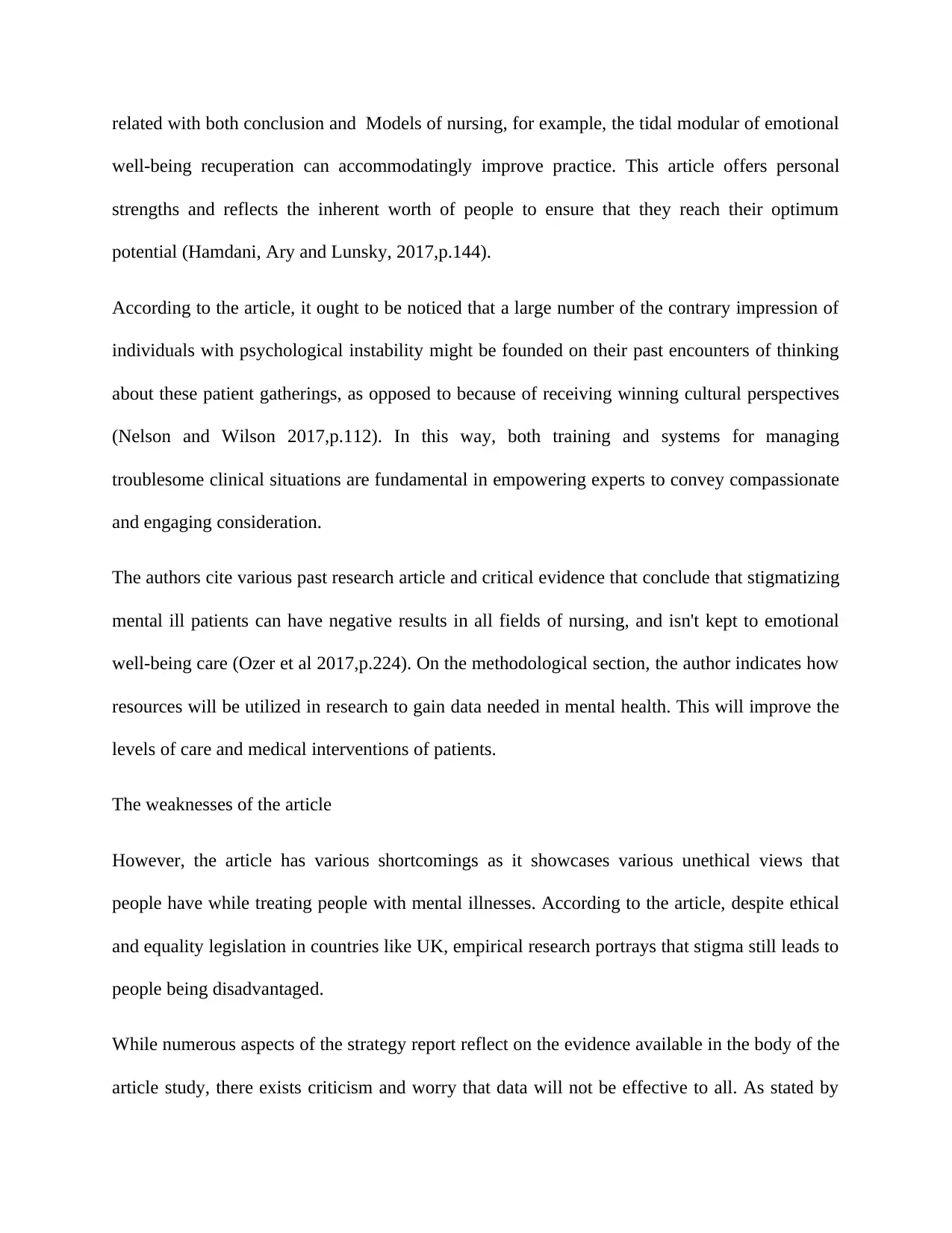
related with both conclusion and Models of nursing, for example, the tidal modular of emotional
well-being recuperation can accommodatingly improve practice. This article offers personal
strengths and reflects the inherent worth of people to ensure that they reach their optimum
potential (Hamdani, Ary and Lunsky, 2017,p.144).
According to the article, it ought to be noticed that a large number of the contrary impression of
individuals with psychological instability might be founded on their past encounters of thinking
about these patient gatherings, as opposed to because of receiving winning cultural perspectives
(Nelson and Wilson 2017,p.112). In this way, both training and systems for managing
troublesome clinical situations are fundamental in empowering experts to convey compassionate
and engaging consideration.
The authors cite various past research article and critical evidence that conclude that stigmatizing
mental ill patients can have negative results in all fields of nursing, and isn't kept to emotional
well-being care (Ozer et al 2017,p.224). On the methodological section, the author indicates how
resources will be utilized in research to gain data needed in mental health. This will improve the
levels of care and medical interventions of patients.
The weaknesses of the article
However, the article has various shortcomings as it showcases various unethical views that
people have while treating people with mental illnesses. According to the article, despite ethical
and equality legislation in countries like UK, empirical research portrays that stigma still leads to
people being disadvantaged.
While numerous aspects of the strategy report reflect on the evidence available in the body of the
article study, there exists criticism and worry that data will not be effective to all. As stated by
well-being recuperation can accommodatingly improve practice. This article offers personal
strengths and reflects the inherent worth of people to ensure that they reach their optimum
potential (Hamdani, Ary and Lunsky, 2017,p.144).
According to the article, it ought to be noticed that a large number of the contrary impression of
individuals with psychological instability might be founded on their past encounters of thinking
about these patient gatherings, as opposed to because of receiving winning cultural perspectives
(Nelson and Wilson 2017,p.112). In this way, both training and systems for managing
troublesome clinical situations are fundamental in empowering experts to convey compassionate
and engaging consideration.
The authors cite various past research article and critical evidence that conclude that stigmatizing
mental ill patients can have negative results in all fields of nursing, and isn't kept to emotional
well-being care (Ozer et al 2017,p.224). On the methodological section, the author indicates how
resources will be utilized in research to gain data needed in mental health. This will improve the
levels of care and medical interventions of patients.
The weaknesses of the article
However, the article has various shortcomings as it showcases various unethical views that
people have while treating people with mental illnesses. According to the article, despite ethical
and equality legislation in countries like UK, empirical research portrays that stigma still leads to
people being disadvantaged.
While numerous aspects of the strategy report reflect on the evidence available in the body of the
article study, there exists criticism and worry that data will not be effective to all. As stated by
Paraphrase This Document
Need a fresh take? Get an instant paraphrase of this document with our AI Paraphraser
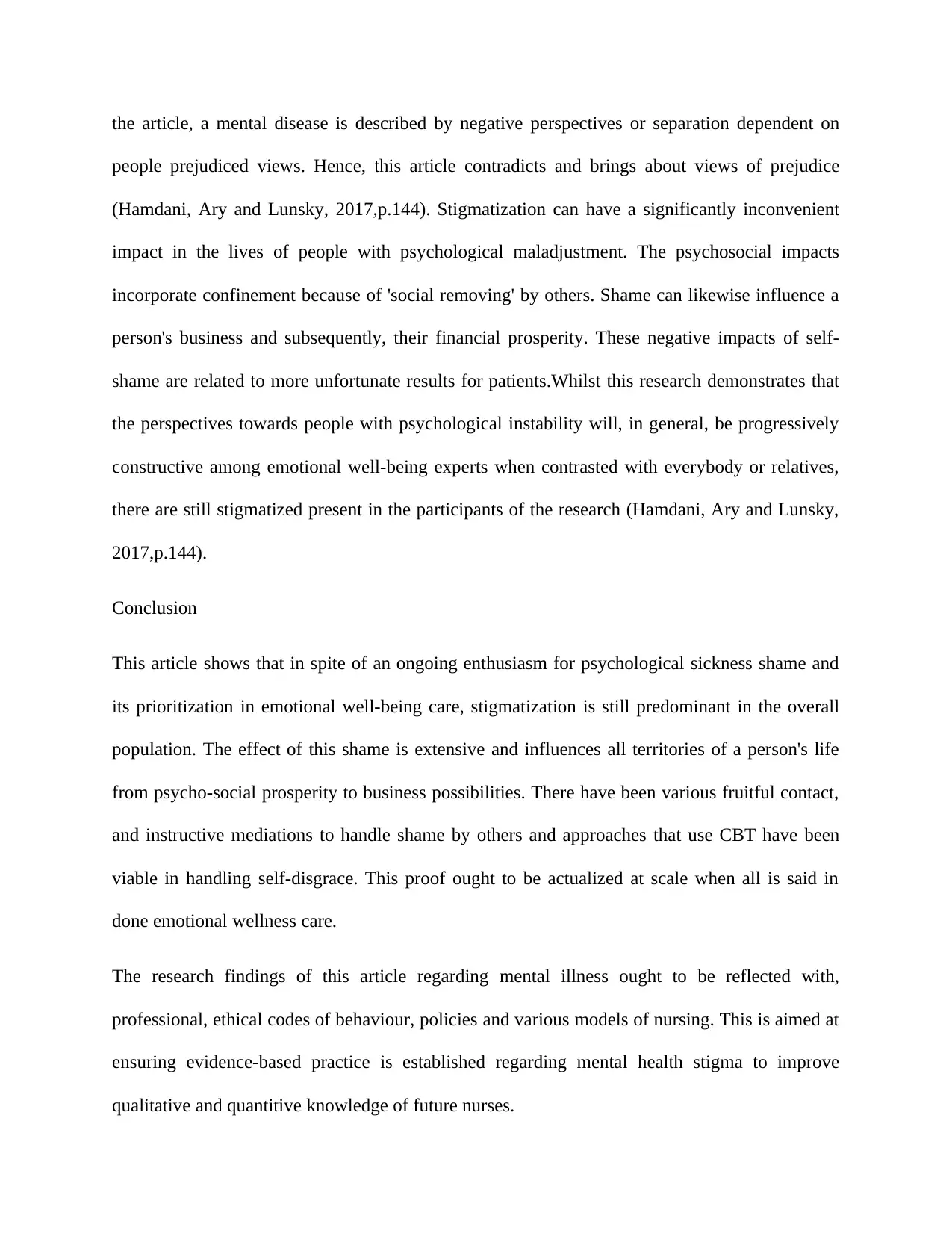
the article, a mental disease is described by negative perspectives or separation dependent on
people prejudiced views. Hence, this article contradicts and brings about views of prejudice
(Hamdani, Ary and Lunsky, 2017,p.144). Stigmatization can have a significantly inconvenient
impact in the lives of people with psychological maladjustment. The psychosocial impacts
incorporate confinement because of 'social removing' by others. Shame can likewise influence a
person's business and subsequently, their financial prosperity. These negative impacts of self-
shame are related to more unfortunate results for patients.Whilst this research demonstrates that
the perspectives towards people with psychological instability will, in general, be progressively
constructive among emotional well-being experts when contrasted with everybody or relatives,
there are still stigmatized present in the participants of the research (Hamdani, Ary and Lunsky,
2017,p.144).
Conclusion
This article shows that in spite of an ongoing enthusiasm for psychological sickness shame and
its prioritization in emotional well-being care, stigmatization is still predominant in the overall
population. The effect of this shame is extensive and influences all territories of a person's life
from psycho-social prosperity to business possibilities. There have been various fruitful contact,
and instructive mediations to handle shame by others and approaches that use CBT have been
viable in handling self-disgrace. This proof ought to be actualized at scale when all is said in
done emotional wellness care.
The research findings of this article regarding mental illness ought to be reflected with,
professional, ethical codes of behaviour, policies and various models of nursing. This is aimed at
ensuring evidence-based practice is established regarding mental health stigma to improve
qualitative and quantitive knowledge of future nurses.
people prejudiced views. Hence, this article contradicts and brings about views of prejudice
(Hamdani, Ary and Lunsky, 2017,p.144). Stigmatization can have a significantly inconvenient
impact in the lives of people with psychological maladjustment. The psychosocial impacts
incorporate confinement because of 'social removing' by others. Shame can likewise influence a
person's business and subsequently, their financial prosperity. These negative impacts of self-
shame are related to more unfortunate results for patients.Whilst this research demonstrates that
the perspectives towards people with psychological instability will, in general, be progressively
constructive among emotional well-being experts when contrasted with everybody or relatives,
there are still stigmatized present in the participants of the research (Hamdani, Ary and Lunsky,
2017,p.144).
Conclusion
This article shows that in spite of an ongoing enthusiasm for psychological sickness shame and
its prioritization in emotional well-being care, stigmatization is still predominant in the overall
population. The effect of this shame is extensive and influences all territories of a person's life
from psycho-social prosperity to business possibilities. There have been various fruitful contact,
and instructive mediations to handle shame by others and approaches that use CBT have been
viable in handling self-disgrace. This proof ought to be actualized at scale when all is said in
done emotional wellness care.
The research findings of this article regarding mental illness ought to be reflected with,
professional, ethical codes of behaviour, policies and various models of nursing. This is aimed at
ensuring evidence-based practice is established regarding mental health stigma to improve
qualitative and quantitive knowledge of future nurses.
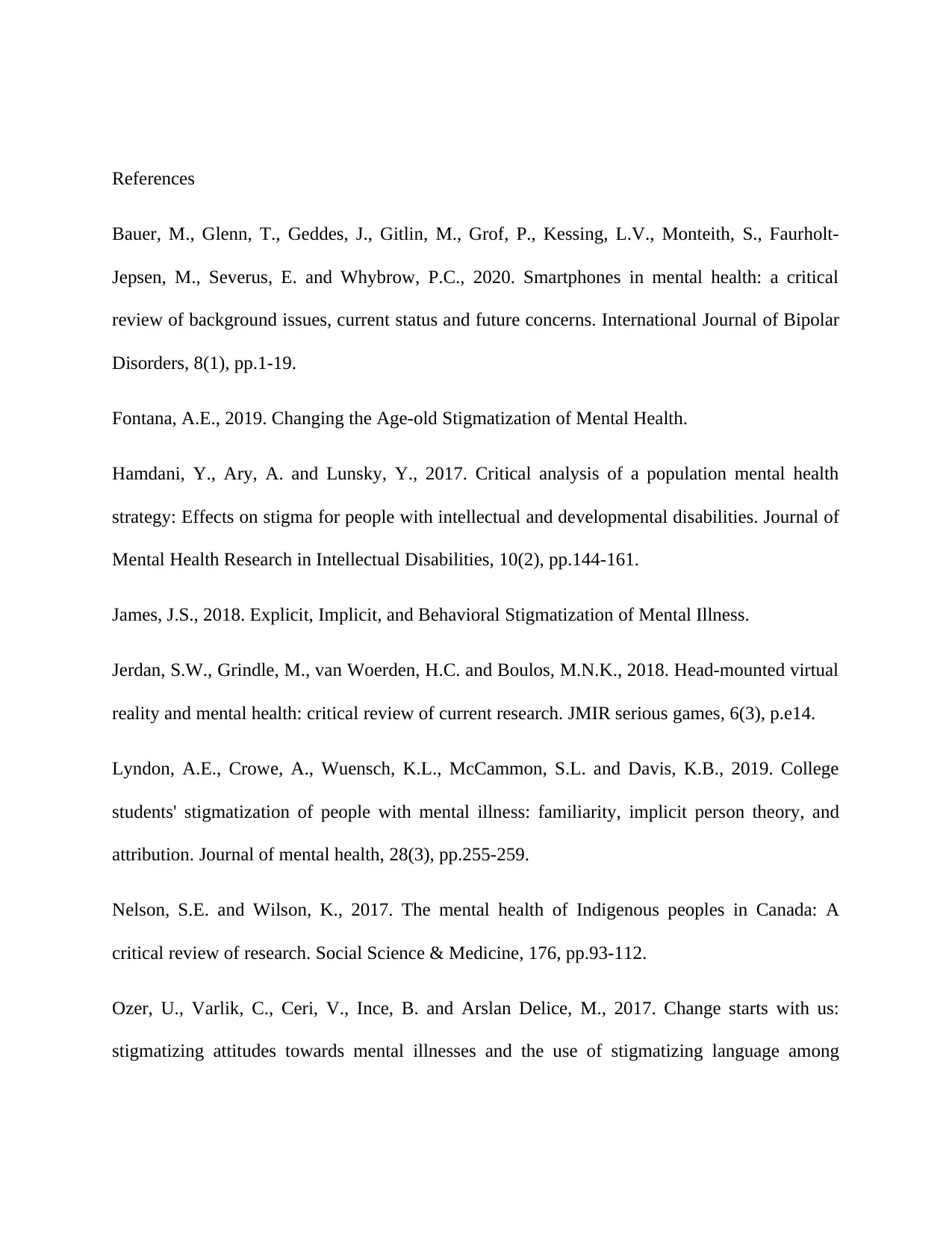
References
Bauer, M., Glenn, T., Geddes, J., Gitlin, M., Grof, P., Kessing, L.V., Monteith, S., Faurholt-
Jepsen, M., Severus, E. and Whybrow, P.C., 2020. Smartphones in mental health: a critical
review of background issues, current status and future concerns. International Journal of Bipolar
Disorders, 8(1), pp.1-19.
Fontana, A.E., 2019. Changing the Age-old Stigmatization of Mental Health.
Hamdani, Y., Ary, A. and Lunsky, Y., 2017. Critical analysis of a population mental health
strategy: Effects on stigma for people with intellectual and developmental disabilities. Journal of
Mental Health Research in Intellectual Disabilities, 10(2), pp.144-161.
James, J.S., 2018. Explicit, Implicit, and Behavioral Stigmatization of Mental Illness.
Jerdan, S.W., Grindle, M., van Woerden, H.C. and Boulos, M.N.K., 2018. Head-mounted virtual
reality and mental health: critical review of current research. JMIR serious games, 6(3), p.e14.
Lyndon, A.E., Crowe, A., Wuensch, K.L., McCammon, S.L. and Davis, K.B., 2019. College
students' stigmatization of people with mental illness: familiarity, implicit person theory, and
attribution. Journal of mental health, 28(3), pp.255-259.
Nelson, S.E. and Wilson, K., 2017. The mental health of Indigenous peoples in Canada: A
critical review of research. Social Science & Medicine, 176, pp.93-112.
Ozer, U., Varlik, C., Ceri, V., Ince, B. and Arslan Delice, M., 2017. Change starts with us:
stigmatizing attitudes towards mental illnesses and the use of stigmatizing language among
Bauer, M., Glenn, T., Geddes, J., Gitlin, M., Grof, P., Kessing, L.V., Monteith, S., Faurholt-
Jepsen, M., Severus, E. and Whybrow, P.C., 2020. Smartphones in mental health: a critical
review of background issues, current status and future concerns. International Journal of Bipolar
Disorders, 8(1), pp.1-19.
Fontana, A.E., 2019. Changing the Age-old Stigmatization of Mental Health.
Hamdani, Y., Ary, A. and Lunsky, Y., 2017. Critical analysis of a population mental health
strategy: Effects on stigma for people with intellectual and developmental disabilities. Journal of
Mental Health Research in Intellectual Disabilities, 10(2), pp.144-161.
James, J.S., 2018. Explicit, Implicit, and Behavioral Stigmatization of Mental Illness.
Jerdan, S.W., Grindle, M., van Woerden, H.C. and Boulos, M.N.K., 2018. Head-mounted virtual
reality and mental health: critical review of current research. JMIR serious games, 6(3), p.e14.
Lyndon, A.E., Crowe, A., Wuensch, K.L., McCammon, S.L. and Davis, K.B., 2019. College
students' stigmatization of people with mental illness: familiarity, implicit person theory, and
attribution. Journal of mental health, 28(3), pp.255-259.
Nelson, S.E. and Wilson, K., 2017. The mental health of Indigenous peoples in Canada: A
critical review of research. Social Science & Medicine, 176, pp.93-112.
Ozer, U., Varlik, C., Ceri, V., Ince, B. and Arslan Delice, M., 2017. Change starts with us:
stigmatizing attitudes towards mental illnesses and the use of stigmatizing language among
⊘ This is a preview!⊘
Do you want full access?
Subscribe today to unlock all pages.

Trusted by 1+ million students worldwide
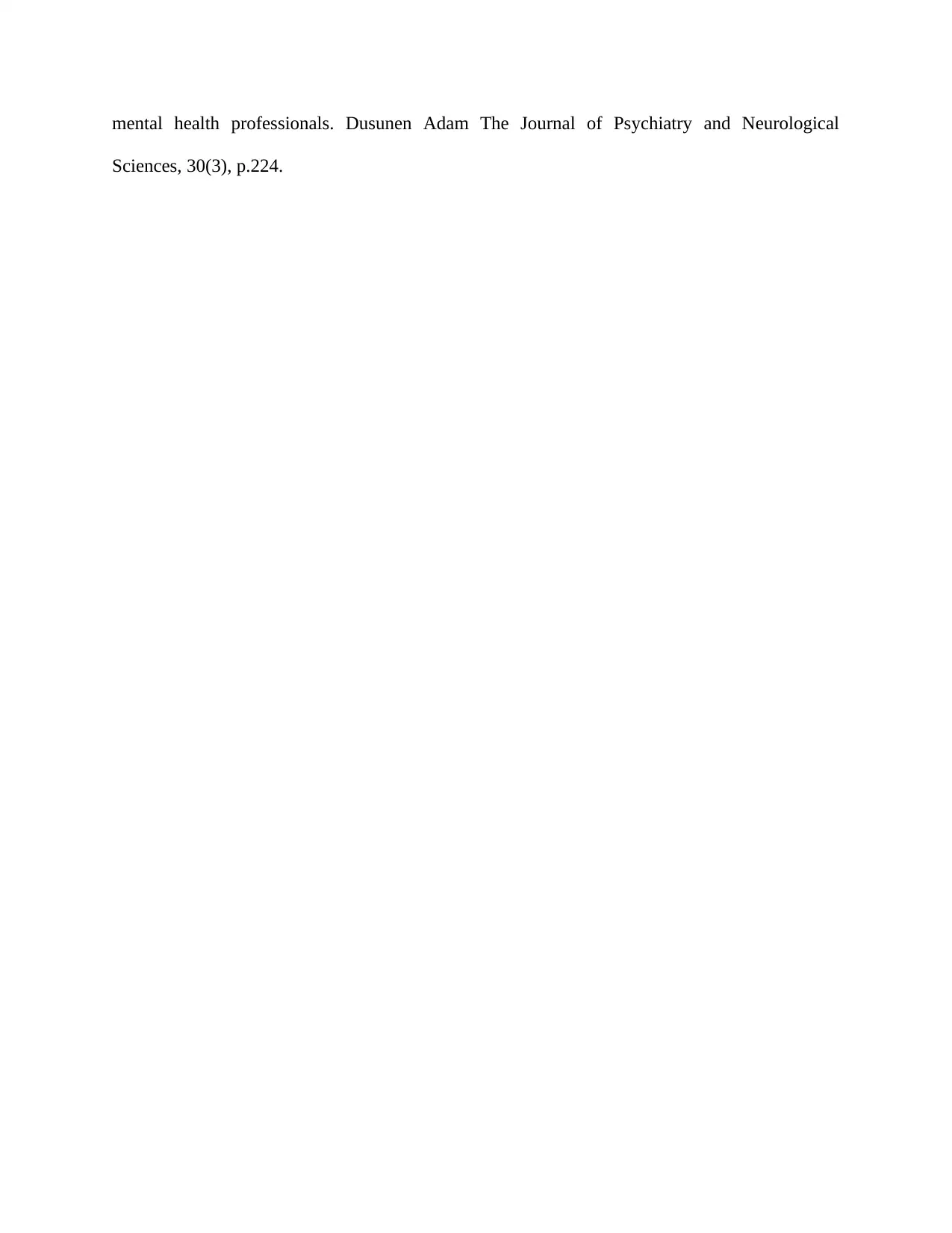
mental health professionals. Dusunen Adam The Journal of Psychiatry and Neurological
Sciences, 30(3), p.224.
Sciences, 30(3), p.224.
1 out of 7
Related Documents
Your All-in-One AI-Powered Toolkit for Academic Success.
+13062052269
info@desklib.com
Available 24*7 on WhatsApp / Email
![[object Object]](/_next/static/media/star-bottom.7253800d.svg)
Unlock your academic potential
Copyright © 2020–2025 A2Z Services. All Rights Reserved. Developed and managed by ZUCOL.




